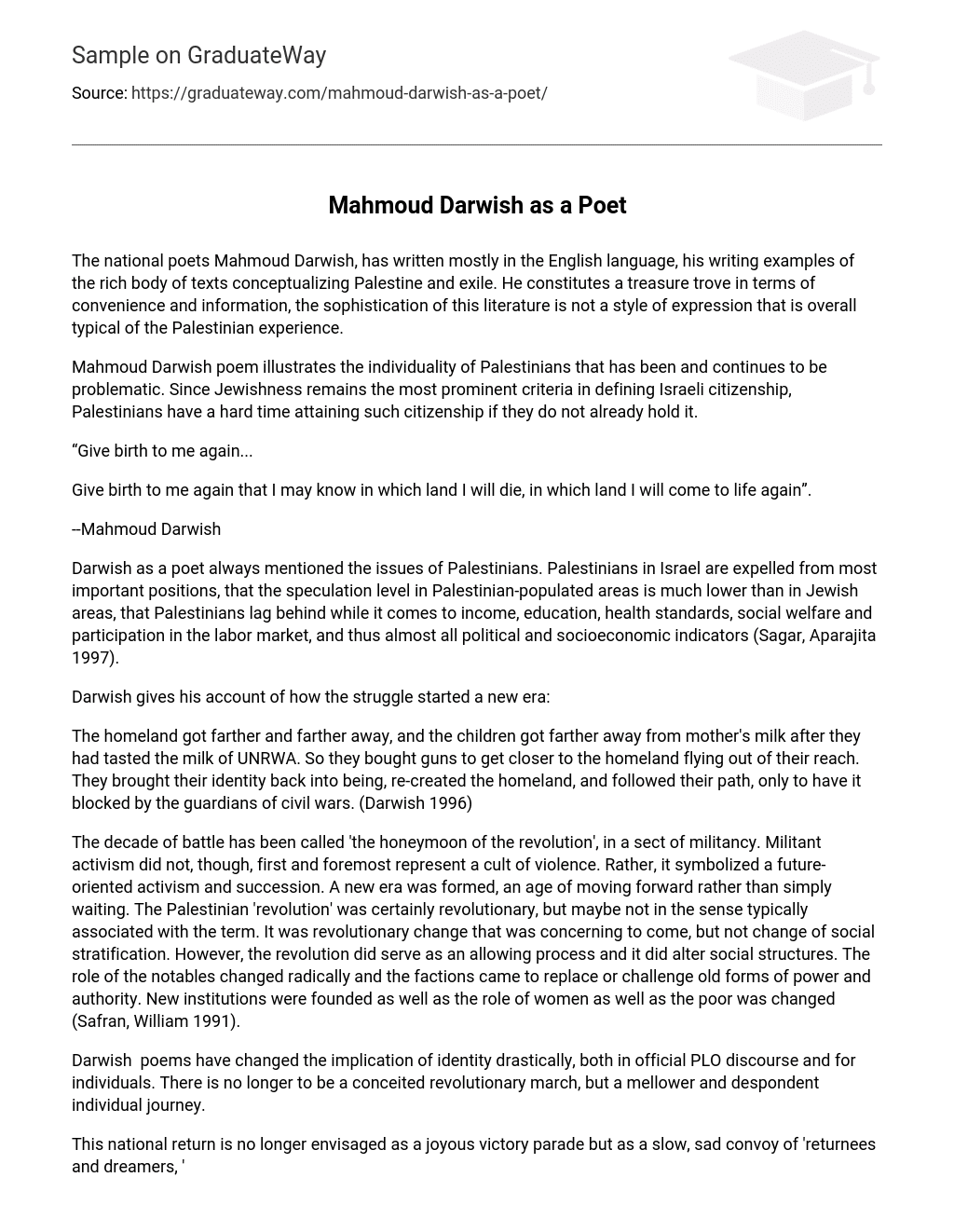The national poets Mahmoud Darwish, has written mostly in the English language, his writing examples of the rich body of texts conceptualizing Palestine and exile. He constitutes a treasure trove in terms of convenience and information, the sophistication of this literature is not a style of expression that is overall typical of the Palestinian experience.
Mahmoud Darwish poem illustrates the individuality of Palestinians that has been and continues to be problematic. Since Jewishness remains the most prominent criteria in defining Israeli citizenship, Palestinians have a hard time attaining such citizenship if they do not already hold it.
“Give birth to me again…
Give birth to me again that I may know in which land I will die, in which land I will come to life again”.
–Mahmoud Darwish
Darwish as a poet always mentioned the issues of Palestinians. Palestinians in Israel are expelled from most important positions, that the speculation level in Palestinian-populated areas is much lower than in Jewish areas, that Palestinians lag behind while it comes to income, education, health standards, social welfare and participation in the labor market, and thus almost all political and socioeconomic indicators (Sagar, Aparajita 1997).
Darwish gives his account of how the struggle started a new era:
The homeland got farther and farther away, and the children got farther away from mother’s milk after they had tasted the milk of UNRWA. So they bought guns to get closer to the homeland flying out of their reach. They brought their identity back into being, re-created the homeland, and followed their path, only to have it blocked by the guardians of civil wars. (Darwish 1996)
The decade of battle has been called ‘the honeymoon of the revolution’, in a sect of militancy. Militant activism did not, though, first and foremost represent a cult of violence. Rather, it symbolized a future-oriented activism and succession. A new era was formed, an age of moving forward rather than simply waiting. The Palestinian ‘revolution’ was certainly revolutionary, but maybe not in the sense typically associated with the term. It was revolutionary change that was concerning to come, but not change of social stratification. However, the revolution did serve as an allowing process and it did alter social structures. The role of the notables changed radically and the factions came to replace or challenge old forms of power and authority. New institutions were founded as well as the role of women as well as the poor was changed (Safran, William 1991).
Darwish poems have changed the implication of identity drastically, both in official PLO discourse and for individuals. There is no longer to be a conceited revolutionary march, but a mellower and despondent individual journey.
This national return is no longer envisaged as a joyous victory parade but as a slow, sad convoy of ‘returnees and dreamers, ‘ as Mahmoud Darwish wrote describes the ‘returnees’ of the late eighties as people who, after ‘an absurd journey of exile, ‘ emerge ‘from the end of a long tunnel into the light…return from heroic stories to simple words, waving neither exultant hands nor flags to mark the miracle.’ They return wary from the sea and desert air, without stating the borders, homes, and villages to which they are headed. ‘They return, ‘ Darwish writes in the plural concerning his people, ‘but I shall not return’. (Rubinstein 1991:132)
Reference:
Mahmoud Darwish http://www.cactus48.com/murder.html
Mahmoud Darwish. From Memory For Forgetfulness , translated from the Arabic by Ibrahim Muhawi, University of California Press, 1996. Also Available At: http://weekly.ahram.org.eg/2008/897/sc5.htm
Rubinstein, Danny (1991), The People of Nowhere: The Palestinian Vision of Home, Times Books. New York and Toronto.
Safran, William (1991), ‘Diasporas in Modern Societies: Myths of Homeland and Return’, Diaspora, 1(1), pp. 83-99.
Sagar, Aparajita (1997) ‘Homes and Postcoloniality’, Diaspora, vol. 6, no. 2





